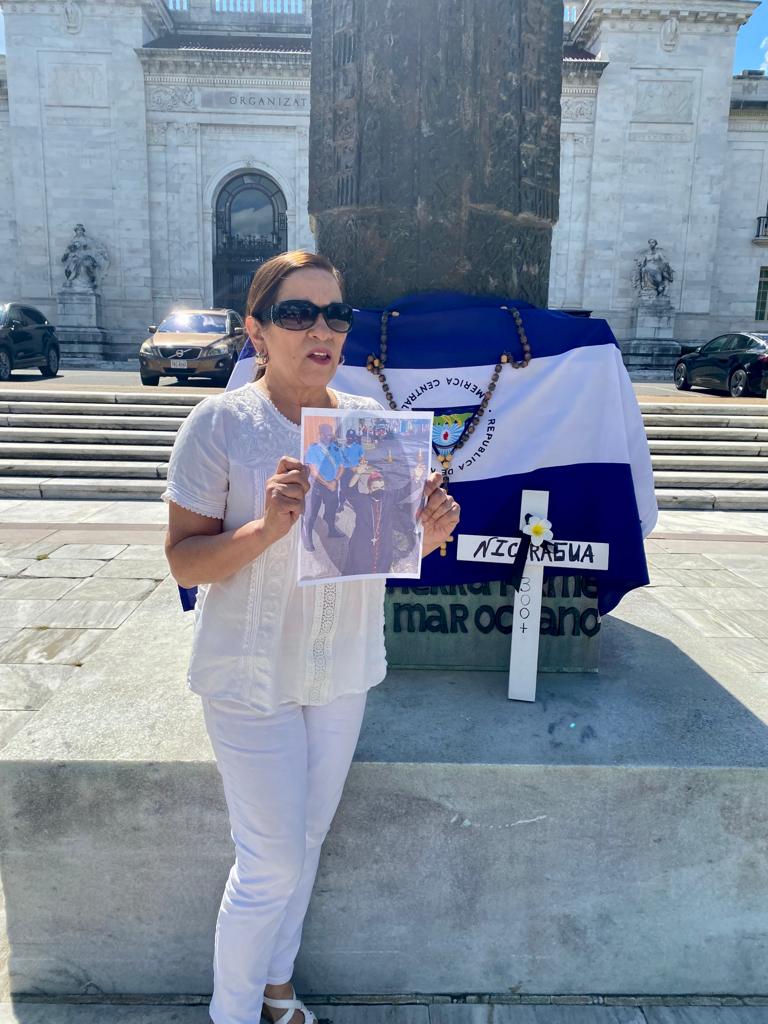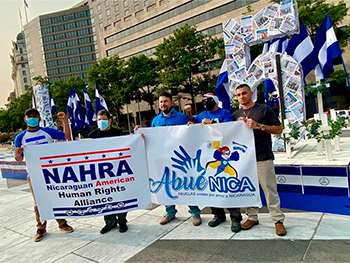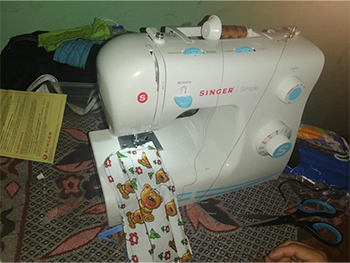
At the beginning of the sociopolitical crisis in Nicaragua on April 19, 2018, when the first murders by the regime occurred, three grandmothers in different states of the United States, Muriel Saenz, Leticia Morales, and Anita Wells, were working from their homes to collect funds and help the injured who were in various hospitals and clandestine clinics within Nicaragua.
Through a mutual friend, they contacted each other and joined forces to be more effective in assisting their Nicaraguan brothers and sisters, as repression and persecution within Nicaragua increased daily. From our "trenches" in the kitchens of our homes, the three grandmothers managed to individually assist the injured, the young people who fled the country to save their lives, and the internally displaced in different areas of Nicaragua, through donations and fundraising events.
In November 2018, we attended a call in Washington, D.C., where a large number of Nicaraguans gathered, most of whom were part of those who had to go into exile after the triumph of the Sandinista revolution and the establishment of a communist government in 1979. From that meeting emerged "the Nicaraguan diaspora" in the United States, nonexistent until then, even after forty years of exile. Seeing the various political and humanitarian needs, they organized several aid groups, many of which eventually became legally registered organizations.
In February 2019, the three grandmothers became part of the founders of NAHRA (Nicaraguan American Human Rights Alliance), an organization dedicated to supporting the immigration processes of those fleeing the country and providing accompaniment to those detained in immigration jails.

Abuenica Inc. was legally registered in the state of Virginia on March 25, 2019, obtaining 501-C3 status on May 7, 2019.
Initial aid focused on Honduras, where many people fled to save their lives and where they did not have the assistance that was provided to the thousands who were leaving for Costa Rica and were making international news. Abuenica focused on supporting several shelters: one in Tegucigalpa, where 29 Nicaraguans were taking refuge, and two in the Trojes, Danlí area, where there were two shelters for farmers and their families in precarious and inhumane conditions.
In collaboration with a grandmother in Tegucigalpa, they worked alongside related organizations, CIPRODEH and CEPUDO, and managed to send humanitarian aid consisting of mattresses for 66 people, blankets, towels, stretchers for transporting the injured, portable surgical equipment to remove bullets from their bodies and treat injuries that occurred along the rocky path they traversed, medications for the elderly, powdered milk, and diapers for children. Among them were 13 children of different ages, including a pair of 18-month-old twins. From Virginia, United States, boxes of clothing were sent to cover the three shelters and toys during Christmas.
Quintals of beans, corn, and basic foods in the Nicaraguan diet, powdered milk for children, and general food supplies were distributed to 95 refugees in Honduras. The grandmother in Honduras organized events to raise funds and provide cultural and spiritual support to the refugees.
The first refugee that Abuenica supported left Jinotega on foot and crossed mountains and rivers for eight days to save his life. Upon arriving in Honduras with the address and contacts provided by Abuenica, he contacted human rights organizations who placed him in a shelter in Tegucigalpa. This was the door that opened the way for many who were fleeing the terror that the regime exerted on the population, and with Abuenica's help, they managed to reach Honduras, Costa Rica, Guatemala, Mexico, and Panama.
During the cleanup operation carried out throughout the country, Abuenica provided assistance to different families with the purchase of coffins and medication to treat the injured in clandestine clinics that were organized in the Jinotega area. Humanitarian assistance was also provided to relatives of those killed in Jinotega during that massacre, including 12 orphaned children under the care of a grandmother after their parents had to flee. Food was distributed during the months when different neighborhoods were affected by barricades, and private transportation was provided to transfer the injured to safe areas.
One of the main objectives of Abuenica has been the defense of political prisoners in pursuit of their release. Through fundraising on social media and private contributions, legal actions have been carried out in Europe, several Latin American countries, and the United States. Assistance was provided in the form of packages to some relatives of political prisoners whose heads of household were in prison.
Abuenica's collaboration with other organizations has allowed them to file complaints with the OAS, USAID, the U.S. Department of State, MESENI, and other human rights organizations since 2019.
In February 2020, Abuenica, with the help of Mending Kids International, contributed to the operation of a girl with hydrocephalus in the Santa Lucía area. The operation was a success, and follow-up has been provided for three years, offering therapy with educational videos for the family, a second surgery in 2021, special shoes, and to date, continues to support the psychic, physical, and motor development of our beloved Ariana.
After this campaign, two of the founding grandmothers of Abuenica decided to separate from the organization and focus on specific areas of the country, near the border, where they had more access to the exiles who were arriving and increasing day by day. One of the grandmothers founded her organization focused and dedicated to the mental health of our exiled brothers in different countries of the world. The other grandmother discovered her calling to help locate exiles who had disappeared in the Texas desert area, visited morgues, and established contacts with local universities for the search of people buried in mass graves, as well as assisting with accompaniment in migration cases and detention centers. The organizations they founded in Texas have helped thousands of Nicaraguan brothers who have arrived through those border points. The work of both is immeasurable, and to this day, they collaborate in helping exiles and the Nicaraguan people who suffer persecution, siege, and death.
In April 2020, the entire world faced the coronavirus (COVID-19) pandemic, and Abuenica was part of the organizations that dedicated themselves to education on prevention and care of COVID, since the regime denied the existence of the virus and did not provide protective equipment to medical personnel nor instructed the population about the danger of the pandemic, concealing the number of deaths, executing clandestine burials, and generating an atmosphere of terror and persecution on the subject. It was essential to provide information to the population that received confusing messages and exposed others due to the lack of education on how to deal with the virus by the responsible authorities. Abuenica, together with the local Lions Club in Jinotega, took care of making "screens" or facial protection equipment for medical personnel in the region, and it is worth mentioning that, thanks to Nicaraguan ingenuity, to save costs and due to the emergency, they were made from x-ray material at a minimal cost. The Nicaraguan regime did not provide hospitals or clinics with protective equipment and banned the use of masks. Medical protective equipment was delivered to a total of 150 healthcare workers in the Jinotega area and its municipalities.
Abuenica bought a sewing machine and materials to make cloth masks and distribute them in the most marginalized and poorest neighborhoods of the city. A total of 250 masks were made, including children's masks with child-friendly designs. This action resulted in the dismissal of the person who made the masks and her husband, who, being a former political prisoner, was threatened with being returned to prison for disobeying government orders. As the mother was the sole provider of income, this family was left helpless and eventually left the country.

Abuenica has helped create small jobs or industries for people to be self-sustainable: sewing machines for seamstresses in Santa Lucía and Jinotega, equipment to set up a small tortilla shop for a single mother, portable pump and equipment for car washing, grill to make chicken at community fairs for a group of four internally displaced people, car washing pump for a group of refugees in Costa Rica, computers, microphones, and electronic equipment for people working from home in Costa Rica and Jinotega, material and equipment for a small restaurant in Guatemala.
Abuenica organized a collection called "A House for Elea" for a mother whose two of her four children were killed by the regime. They gathered $7,500.00, and it was possible to buy a plot of land where she will build her house someday since, being harassed and persecuted by the regime, she had to go into exile in Costa Rica.
In February 2020, Abuenica once again attended a call for Nicaraguan American origin organizations and became part of CONEXIÓN-NICA-USA (CNUSA), an entity made up of eight legally registered non-profit organizations in different states of the United States. Abuenica, being in charge of the CNUSA Human Rights Committee, during the Covid-19 pandemic, was the fiscal conduit for a fundraising collection made in conjunction with the organizations of the entity. In a campaign with the collaboration of Mr. Denis Martínez, enough funds were collected to cover protective medical equipment (PPE) for staff at 5 hospitals in Managua and León.
The Covid-19 pandemic greatly affected many communities in Nicaragua, and Abuenica, through donations and fundraising events, managed to assist several families with the purchase of medicines, complete Covid treatment, oxygen tanks, room rental for isolating patients, coffins, and payment for graves in the Santa Lucía, Boaco area for people with limited resources.
During the four years since its formation, Abuenica, through its volunteers, has managed to assist Nicaraguan brothers and sisters, victims of repression and persecution by the Nicaraguan regime in different ways and in different countries. The president of the organization, Anita Wells, being a board member of the NAHRA organization and with Abuenica being an allied member of that organization, has voluntarily collaborated in accompanying cases of exiles, helping to fill out political asylum forms, work permits, transcribing and translating their documents, and preparing letters of support and sworn statements for hundreds of Nicaraguan exiles.